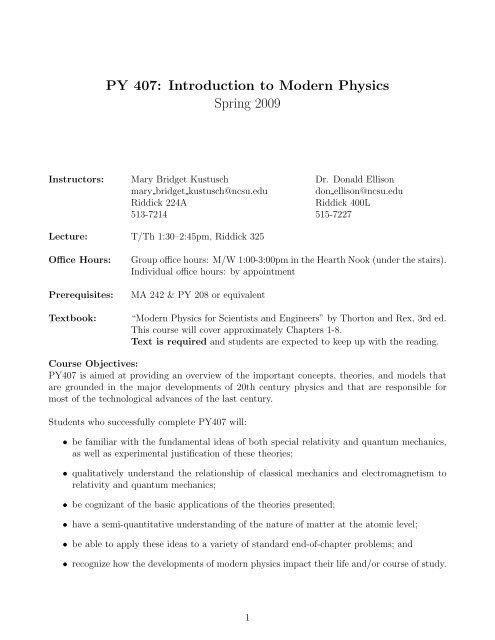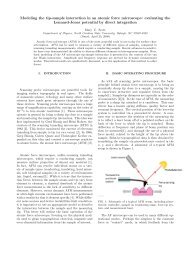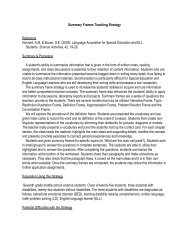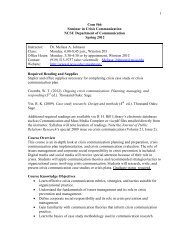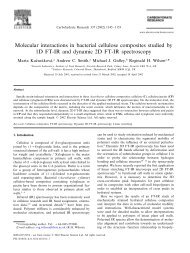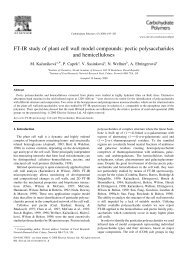PY 407: Introduction to Modern Physics Spring 2009
PY 407: Introduction to Modern Physics Spring 2009
PY 407: Introduction to Modern Physics Spring 2009
Create successful ePaper yourself
Turn your PDF publications into a flip-book with our unique Google optimized e-Paper software.
<strong>PY</strong> <strong>407</strong>: <strong>Introduction</strong> <strong>to</strong> <strong>Modern</strong> <strong>Physics</strong><br />
<strong>Spring</strong> <strong>2009</strong><br />
Instruc<strong>to</strong>rs: Mary Bridget Kustusch Dr. Donald Ellison<br />
mary bridget kustusch@ncsu.edu don ellison@ncsu.edu<br />
Riddick 224A<br />
Riddick 400L<br />
513-7214 515-7227<br />
Lecture: T/Th 1:30–2:45pm, Riddick 325<br />
Office Hours:<br />
Prerequisites:<br />
Textbook:<br />
Group office hours: M/W 1:00-3:00pm in the Hearth Nook (under the stairs).<br />
Individual office hours: by appointment<br />
MA 242 & <strong>PY</strong> 208 or equivalent<br />
“<strong>Modern</strong> <strong>Physics</strong> for Scientists and Engineers” by Thor<strong>to</strong>n and Rex, 3rd ed.<br />
This course will cover approximately Chapters 1-8.<br />
Text is required and students are expected <strong>to</strong> keep up with the reading.<br />
Course Objectives:<br />
<strong>PY</strong><strong>407</strong> is aimed at providing an overview of the important concepts, theories, and models that<br />
are grounded in the major developments of 20th century physics and that are responsible for<br />
most of the technological advances of the last century.<br />
Students who successfully complete <strong>PY</strong><strong>407</strong> will:<br />
• be familiar with the fundamental ideas of both special relativity and quantum mechanics,<br />
as well as experimental justification of these theories;<br />
• qualitatively understand the relationship of classical mechanics and electromagnetism <strong>to</strong><br />
relativity and quantum mechanics;<br />
• be cognizant of the basic applications of the theories presented;<br />
• have a semi-quantitative understanding of the nature of matter at the a<strong>to</strong>mic level;<br />
• be able <strong>to</strong> apply these ideas <strong>to</strong> a variety of standard end-of-chapter problems; and<br />
• recognize how the developments of modern physics impact their life and/or course of study.<br />
1
Teaching Philosophy and Expectations:<br />
The opportunity and process of learning is not easy, but is one of the best things that life has<br />
<strong>to</strong> offer. Learning requires incorporating new information and experience in<strong>to</strong> our current way of<br />
viewing the world. Therefore, every individual is responsible for his or her own learning, since no<br />
one can incorporate something in<strong>to</strong> your experience other than you. As a teacher, it is my job<br />
<strong>to</strong> help facilitate this process: <strong>to</strong> provide new information, <strong>to</strong> challenge old information, and <strong>to</strong><br />
help you incorporate it all in<strong>to</strong> what you already know.<br />
Everyone is capable of learning. However, since each of us has our own interests and abilities,<br />
particular <strong>to</strong>pics may require something different from each of you. For some, this may involve<br />
extra time and effort, but for others, it may mean changing your approach <strong>to</strong> the learning process.<br />
You should not expect <strong>to</strong> know everything we discuss (if you do, you shouldn’t be in this class);<br />
nor should you necessarily expect <strong>to</strong> get it the first time it is covered. Thus, it is important for<br />
you ask questions and <strong>to</strong> tell me if I am not being clear.<br />
The best way <strong>to</strong> learn is through respectful collaboration, which involves entertaining another<br />
person’s perspective while also articulating our own experiences and views. As a result, this<br />
class will provide many opportunities for you <strong>to</strong> work and communicate with your classmates:<br />
through in-class discussions, the group office hours and the final group project. To encourage<br />
this mutual respect and <strong>to</strong> create an environment conducive <strong>to</strong> collaboration, it is expected that<br />
you be present, on time, and prepared <strong>to</strong> participate in class. Any use of cell phones (including<br />
texting) will not be <strong>to</strong>lerated in class and if you choose <strong>to</strong> use your lap<strong>to</strong>p for taking notes, it is<br />
requested that you sit in the back row <strong>to</strong> avoid distracting your classmates.<br />
Grading (see below for description of each requirement):<br />
40 % Midterm Exams (2)<br />
25 % Final Exam<br />
20 % Homework (via WebAssign)<br />
12 % Group project<br />
3 % Attendance/Participation<br />
Midterms:<br />
There will be two midterm exams given during class and are tentatively set for Feb. 17th and<br />
March 31st. The tests will be a mix of multiple choice and free response questions and problems<br />
and they will cover the material in both a qualitative and quantitative manner. You will be<br />
allowed <strong>to</strong> bring your textbook and a calcula<strong>to</strong>r <strong>to</strong> the exam, but no other materials.<br />
Final Exam:<br />
The final exam is scheduled for Tuesday, April 28th from 1-4 pm and will be comprehensive.<br />
Like the midterms, you will be allowed <strong>to</strong> bring your textbook and a calcula<strong>to</strong>r, but no other<br />
materials.<br />
Homework:<br />
Homework assignments will be delivered and graded on WebAssign, a computer homework system.<br />
Before each class, there will be a short assignment (1-2 questions) on the reading. Each week, there<br />
will be one longer assignment that will be due at the end of the week (Friday at 10 pm). You will<br />
need <strong>to</strong> purchase a WebAssign access code and it may be purchased online at www.webassign.net.<br />
2
Group Project:<br />
This course covers a wide variety of <strong>to</strong>pics, few of which we will explore in depth. As a result,<br />
there will be a final project in which you will work in groups of three <strong>to</strong> explore one application<br />
of the physics presented in this course in greater detail.<br />
The format of this project will be a wiki page on the course wiki (http://wikis.lib.ncsu.edu/<br />
index.php/<strong>PY</strong>_<strong>407</strong>) created by the group. There are guidelines for this project, as well as a list<br />
of possible <strong>to</strong>pics on the wiki page. You are not restricted <strong>to</strong> list, but any <strong>to</strong>pic not on this list<br />
must be approved by the instruc<strong>to</strong>r. Groups and <strong>to</strong>pics must be chosen by the first midterm and<br />
the final wiki will be due by the last day of class.<br />
Attendance/Participation:<br />
In lieu of clickers, you will write down your responses <strong>to</strong> in-class questions/problems prior <strong>to</strong><br />
class discussion. At the end of each class, turn in the paper on which you have answered these<br />
questions, including your name and the date. Since all questions will be discussed in class, the<br />
papers will not be graded, but will serve as evidence of your participation and attendance for<br />
that day. If you would like your paper returned, write “Please Return” at the <strong>to</strong>p of the page<br />
and it will be returned the following class.<br />
Academic Integrity Policies:<br />
The University has a formal policy on Academic Integrity and it is expected that all work will<br />
maintain this integrity. Thus, it will be assumed that your work is your own unless collaboration<br />
is explicitly authorized (or required). Working with others on homework is acceptable and encouraged.<br />
However, you will be responsible for learning the material, so make sure that you are<br />
capable of re-working on your own any problems that you submit. Collaboration on the group<br />
project is required and it is expected that the group will function in a productive manner with<br />
all members contributing equally. Please let the instruc<strong>to</strong>r know if a member of your group is<br />
not contributing, so that the situation can be addressed.<br />
As state above, everyone is responsible for his or her learning. While collaboration is important in<br />
technical work, evaluations of individuals also play an important role in engineering and science.<br />
The midterm exams and the final exam are <strong>to</strong> be completed without help from others. Cheating<br />
will be heavily penalized in accord with university regulations. See the NCSU Code of Student<br />
Conduct, sections 7-12, for a reminder of the issues and regulations regarding academic integrity.<br />
Students with Disabilities:<br />
Reasonable accommodations will be made for students with documented disabilities. In order<br />
<strong>to</strong> take advantage of available accommodations, students must register with Disability Services<br />
for Students at 1900 Student Health Center, Campus Box 7509, 515-7653. Students who have a<br />
disability must make an appointment <strong>to</strong> talk with the instruc<strong>to</strong>r during the first week of class,<br />
<strong>to</strong> discuss what the instruc<strong>to</strong>r can do <strong>to</strong> help the student learn effectively.<br />
For additional information, see http://www.ncsu.edu/dso and<br />
http://www.ncsu.edu/provost/hat/current/appendix/appen_k.html.<br />
3
Tentative Schedule:<br />
The sections listed are <strong>to</strong> be read prior <strong>to</strong> coming <strong>to</strong> class on that day.<br />
01/08/09 Chapter 1<br />
01/13/09 2.1-2.4<br />
01/15/09 2.5-2.8, 2.14<br />
01/20/09 Snow Day<br />
01/22/09 2.11-2.13<br />
01/27/09 3.1-3.4<br />
01/29/09 3.5-3.6<br />
02/03/09 3.7-4.1<br />
02/05/09 4.2-4.4<br />
02/10/09 4.5-4.7<br />
02/12/09 Review<br />
02/17/09 Midterm Exam 1<br />
(Groups and <strong>to</strong>pics for research project due)<br />
02/19/09 5.1-5.3<br />
02/24/09 5.4-5.5<br />
02/26/09 5.6-5.8<br />
03/03/09 <strong>Spring</strong> Break - No class<br />
03/05/09 <strong>Spring</strong> Break - No class<br />
03/10/09 6.1<br />
03/12/09 6.2-6.3<br />
03/17/09 6.4-6.5<br />
03/19/09 6.6<br />
03/24/09 6.7<br />
03/26/09 Review<br />
03/31/09 Midterm Exam 2<br />
04/02/09 7.1-7.2<br />
04/07/09 7.3<br />
04/09/09 7.4-7.5<br />
04/14/09 7.6-8.1<br />
04/16/09 8.2<br />
04/21/09 8.3<br />
04/23/09 Review<br />
(Final research project wiki page due)<br />
04/28/09 Final Exam (1-4 pm)<br />
February 11, <strong>2009</strong><br />
4


